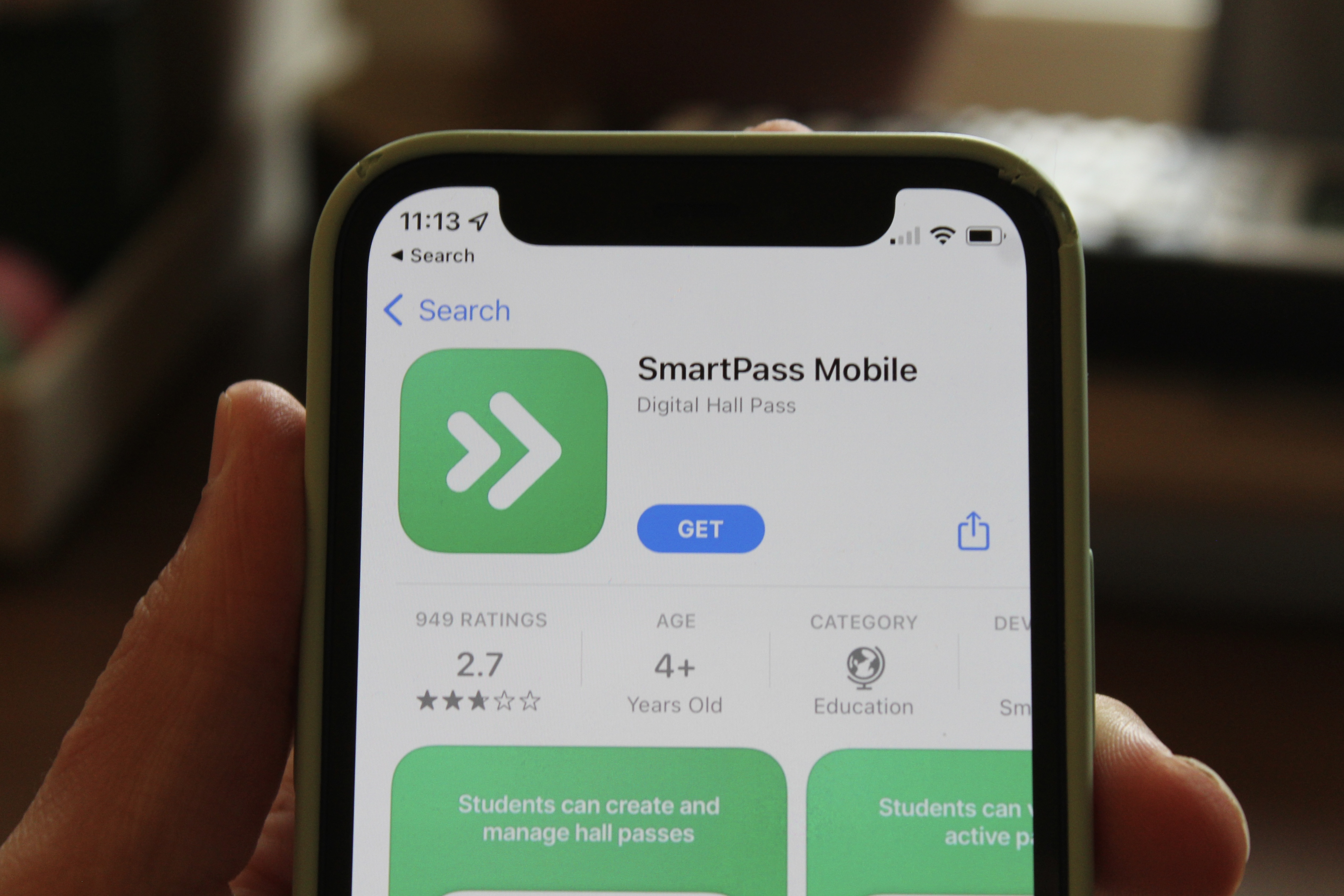
The introduction of a new initiative to improve student attendance this Tuesday brought conflict and controversy to Grant, accentuating a rift between administrators and teachers. Just four days later, its implementation was halted.
SmartPass, a digital hall pass system, was set to be tested by ninth graders, in a pilot program that would last for the remainder of the school year. “If it works really well, we may roll it out for everybody next year,” says Grant Vice Principal Steven Benson, the leader of the initiative.
Benson says that SmartPass’s purpose is to improve low attendance rates. “We noticed that as the year has progressed, this year, that there’s been a lot of challenges with students not only getting the class on time, but also remaining in class,” he says. “I really do believe that (SmartPass) is a strong attempt at curbing a big challenge here at Grant.”
SmartPass was created by three Philadelphia high school juniors. Now in college, they continue to oversee the company.
The system requires students to submit online requests to leave classrooms, either through their mobile devices or shared classroom devices. After receiving digital approval from teachers, these passes enter a school-wide database that campus security can view. Benson planned on using the information in this database to track student data in order to create better-informed attendance policies.
The proposed system would eliminate physical hall passes. “When we’re in the hallway and we come across students without a (physical) pass, we’re going to ask them what their name is. We’ll be able to look on the live view from the administrator perspective and say, oh, yeah, I see you have an active pass,” says Benson.
During the system’s accelerated approval process, neither Grant teachers nor Grant campus security agents were consulted.
Campus Security Agent Michael Dyer questions SmartPass’s installation. “I don’t know if it’s necessary,” he says. “I think you guys have done a way better job of not being in the hallways, of being where you’re supposed to be, compared to the beginning of the year.”
At Tuesday’s staff meeting, teachers voiced their questions and concerns.
“Teachers asked like, well, what other schools are using this?” says Grant teacher Mykhiel Deych. “There’s not a single school in PPS that’s using it.”
Freshman teachers were required to integrate SmartPass into their classrooms by this Monday, less than a week after the system’s introduction.
“Like many teachers, I’m feeling overwhelmed by having to learn something new, very quickly,” says Grant special education teacher Jessica Hayes.
Additionally, teachers have raised concerns about SmartPass’s functions. “What Smartpass does is police students,” says freshmen English teacher Julia Kirkpatrick, who worries that strict time limits and designated locations for student hall passes will damage trust within student and teacher relationships.
Teachers’ misgivings were met with ambivalence. “(Benson) was fairly dismissive, I feel like, of a lot of the things that were being brought up,” says Deych.
In response to teacher concerns, Benson says, “Just like how teachers have a perspective that is different than a student’s perspective, administrators have a perspective that’s different than teacher perspectives.”
He says, “I think an effective teacher is one that also seeks to understand as well, and tries to figure out, like, how we can make this work for everybody, knowing that students come first in all of this.”
One day after SmartPass’s introduction to teachers, the system was presented to ninth graders. In their inquiry classes last Wednesday and Thursday, freshmen were trained on how to use the system. The classes were instructed to download the mobile application on their phones.
Similar to teachers, Grant freshmen had concerns.
“(SmartPass) seems really restricting,” says freshman Ava Wallen. Of their freshmen class, Wallen says, “Everyone was against it.”
Grant freshman Olon Davis worries that using SmartPass will increase the racial profiling that Grant’s students of color experience from campus security agents. When campus security agents must approach students individually in order to search for their names in a database, rather than viewing that they are carrying a physical pass, the potential for racial bias is heightened. “I know that I’ve been told off by security guards more than the majority of like, you know, my white friends have been,” says Davis.
There were no guidelines in place to ensure that the use of SmartPass’s system remained equitable.
SmartPass’s pilot program was set to begin on Monday, April 11. The approval of the system differed from other district technologies, because SmartPass was going to be a pilot program.
Don Wolff, Chief Technology Officer at PPS, says that the IT department had little involvement in SmartPass’s approval. “The pilot of 9th graders at Grant is being led at the school level,” he says. “We have reviewed the application for privacy and it has been approved.”
Normally, community input is sought out before any technology is installed. Wolff says, “If it’s something we (the IT Department) initiate, we reach out to building leaders, principals and to the area regional senior directors and to senior leadership within Portland Public Schools to say this is what we’re wanting to do, here’s the impacts and that sort of thing.” But, Wolff says, “I have not been involved with any of the conversations around SmartPass.”
Grant administration did not seek community approval or parent consent.
Principal James McGee says that he informed his supervisor of the plan to pilot SmartPass, who gave him permission to begin the program.
Grant administrators contacted schools that have used the system. “We did reach out to a few different schools and asked, from different perspectives, from the administrative perspective, from the teacher perspective, from the student perspective, like what was the general feel about the app?” says Benson.
The rushed process meant that a crucial detail was missed: SmartPass’s technology is not compliant with the Individuals with Disabilities Education Act. The system does not let school administrators allow certain students unrestricted access to the hallways, in accordance with their Individualized Education Plans.
On Saturday, April 9, four days after beginning the system’s rollout, Grant administration announced that the SmartPass pilot had been halted. “We were led to believe that we could create electronic passes that were tailored to students with individual mental health or physical needs,” Grant administration announced in an email to teachers Saturday. “We have decided to pause on the rollout of this system and continue to monitor whether or not the organization is able to provide the flexibility we know is needed to support all our students.”
Had the pilot program moved forward at Grant, administrators planned on utilizing all of SmartPass’s features. The system gives administrators the ability to view every single hall pass a student has requested throughout their entire high school career.
“We want to support students throughout their whole high school experience,” says Benson, “And so if a freshman this year has, maybe, attendance challenges, next year we also would like to know what those challenges were from last year.”
There was no plan for this student information to be deleted—SmartPass’s data would be a permanent record.
Grant administrators also intended to use SmartPass’s “Encounter Prevention” function. This feature allows administrators to prevent groups of people from being in the hallway at the same time. Administrators can make groups, name them and add notes on them, all of which teachers can see.
Only one student from a group may check out a pass at a time. If other students in their group attempt to make a pass, they are denied.
When two students from a prevented group attempt to make a hall pass at the same time, SmartPass logs this into their “Prevented Encounters’’ database.
“If we noticed that students tend to always congregate in the hallway together and are making poor decisions together, we could have a trial run for like a week,” says Benson.
Administrators planned on overseeing the creation of these groups. There was no plan to include the expertise of school counselors in this feature, and there were no guidelines in place to ensure that the making of these groups was not racially motivated. “All I can say is, you know, as an administration team, we really try our best to unpack any biases we have,” says Benson.
“(SmartPass’s “Encounter Prevention” function) just feels so invasive and intense,” says Deych, “It feels very creepy, and also, it seems like an abuse of power.”
As students and staff regroup after a tumultuous week, the future of Grant’s hall monitoring system remains ambiguous. As of now, SmartPass’s rollout has been halted, but it’s unclear for how long.




